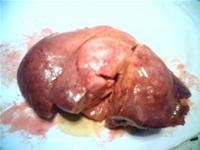 |
|
Radiation therapy for a cancer patient at Ho Chi Minh City Oncology Hospital (Photo: L.TH.H) |
According to Dr. Doan Huu Nam, head of the planning department at Ho Chi Minh City Oncology Hospital, liver cancer is one of the most common cancers, ranking first or second in Ho Chi Minh City. The causes of liver cancer have been identified as being related to viruses and other factors.
80% of cirrhosis patients develop liver cancer
According to Dr. Pham Hung Cuong, deputy head of the surgical department 2 at the Oncology Hospital, when infected with acute Hepatitis B virus (HBV), patients may experience general body aches, muscle pain, mild fever resembling flu symptoms; or loss of appetite, nausea, constipation, and diarrhea.
|
The “culprits” causing the disease The most common factor associated with liver cancer is alcoholic cirrhosis (often seen in European countries) and cirrhosis due to HBV or HCV. In Vietnam, HBV is encountered more frequently than HCV. Statistics show that the infection rate of HBV in Vietnam is currently between 18-24%. Vietnam is classified among the countries with the highest HBV infection rates in the world. Alarmingly, HBV can spread 100 times more easily than the HIV virus. Dr. Pham Hung Cuong and Dr. Doan Huu Nam’s research has found that up to 83% of patients with liver cancer have previously been infected with HBV. |
This symptom typically manifests for about a week before disappearing. As a result, many people are unaware that they have been infected with HBV. In cases of severe HBV infection, patients exhibit symptoms such as jaundice, dark urine, pale stools, enlarged liver, and tenderness upon palpation.
However, according to Dr. Pham Hung Cuong, not everyone infected with HBV becomes ill. This depends on the individual’s ability to protect themselves. Many individuals can live with HBV for their entire lives without developing hepatitis. Among those infected with HBV, about 10-15% will progress to chronic hepatitis.
Of those with chronic hepatitis, 25% will develop cirrhosis; and of those with cirrhosis, 80% will progress to liver cancer. The progression from chronic hepatitis to cirrhosis and then to liver cancer takes about 10-20 years. Therefore, liver cancer typically occurs in individuals aged 30-40 years.
Early detection through ultrasound and blood tests
According to doctors, when liver cancer occurs, patients may experience common symptoms such as abdominal heaviness, right-sided abdominal discomfort, fatigue, loss of appetite, occasional abdominal distension (ascites), weight loss, and in some cases, patients can palpate a mass in the abdomen.
However, by the time these symptoms appear, the disease is usually in a late stage. Each year, the Oncology Hospital receives approximately 600-800 liver cancer cases, of which 98% of patients present at a late stage where surgical intervention is no longer an option. In cases where liver cancer is detected early with tumors smaller than 3 cm, the likelihood of complete recovery is very high. Many patients have been known to live for up to 20 years without recurrence.
Regarding treatment, liver cancer is a rapidly progressing disease. A patient diagnosed with liver cancer, if untreated, typically lives no more than six months. To date, surgery remains the best method for treating liver cancer in its early stages.
Dr. Doan Huu Nam notes that although liver cancer is challenging to treat in advanced stages, it can be detected early through screening in individuals at high risk for liver cancer. In Vietnam, those at high risk are individuals who have previously been infected with HBV. Therefore, individuals who have been infected with HBV should undergo abdominal ultrasound and blood tests for the specific antigen AFP every six months. If uncertain about HBV infection status, individuals should seek health evaluations and blood tests.
Vaccination against HBV to prevent liver cancer
 |
|
Image of liver cancer |
Associate Professor Dr. Nguyen Chan Hung, director of the Oncology Hospital, stated that effective HBV vaccination is available. Early vaccination against HBV is essential for preventing liver cancer in the future. Because of this benefit, the World Health Organization (WHO) has recommended and the Ministry of Health has included HBV vaccination in the expanded immunization program for children under one year old. This preventive measure is very feasible and the cost of vaccination is lower than many other vaccines. As for Hepatitis C virus (HCV), there is currently no vaccine available.
Dr. Doan Huu Nam further notes that some newborns can be infected with HBV from their mothers. The transmission rate of HBV from mother to child is very high: 44%. Many studies confirm that individuals infected with HBV from a young age will ultimately become chronic HBV carriers. Therefore, it is recommended to vaccinate children against HBV right from birth. In addition to postnatal vaccination, immunoglobulins are also administered to protect the child from HBV infection.
Doctors also advise that after receiving the HBV vaccine, individuals should undergo testing to verify the efficacy of the vaccine. In principle, a booster should be administered every five years. Furthermore, individuals who have had hepatitis due to HBV should limit alcohol consumption, as alcohol not only causes cirrhosis but also promotes the rapid proliferation of HBV in the bloodstream and diminishes the liver cells’ resilience against viral attacks.
LE THANH HA


















































